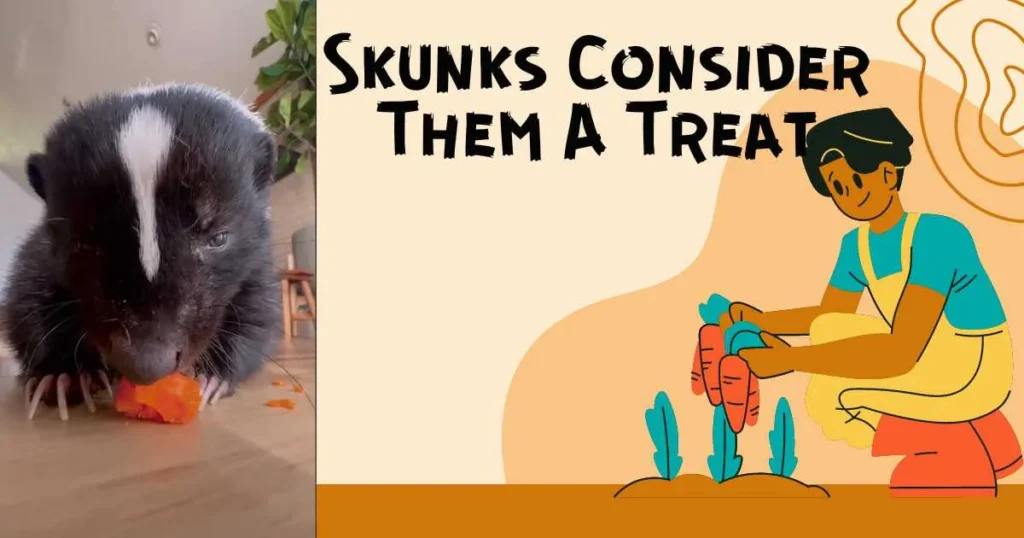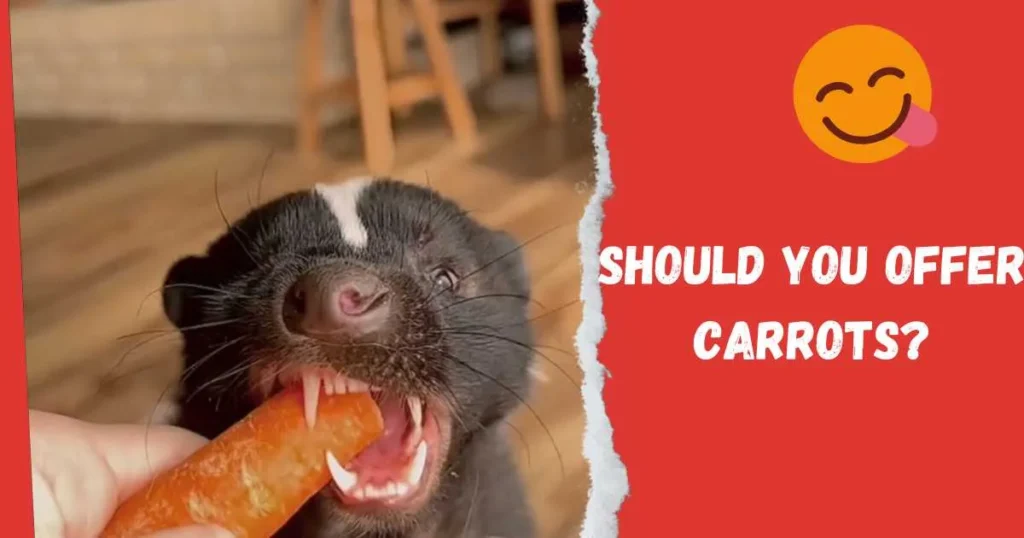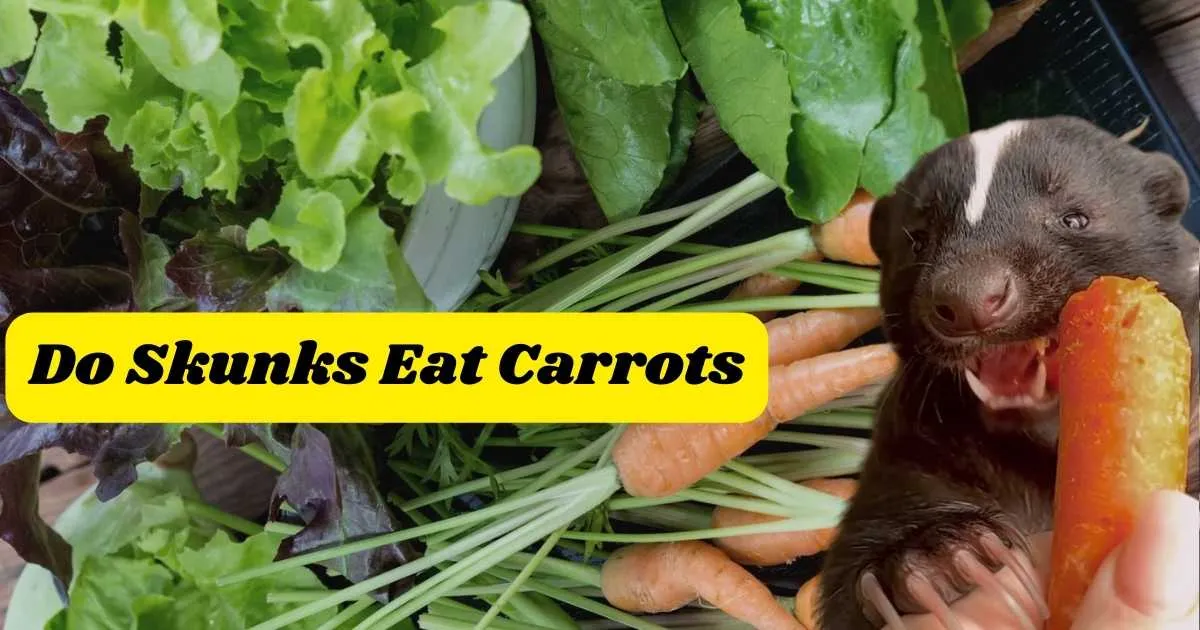Do Skunks Eat Carrots?
Last updated on December 8th, 2024 at 12:33 am
As a skunk owner and wildlife enthusiast, I’ve spent considerable time studying the dietary habits of these fascinating creatures. While skunks are omnivores and enjoy a wide variety of foods, including both animal and plant-based options, the question often arises: Do skunks eat carrots? The answer is yes, skunks can eat carrots, but they are not a primary part of their diet. Carrots provide a crunchy and nutritious treat for skunks, especially when other food sources are limited.
In this detailed guide, we’ll explore why skunks eat carrots, the nutritional benefits, how to offer them safely, and their role in a skunk’s diet in the wild and as pets.
Do Skunks Naturally Eat Carrots?
In the wild, skunks forage for food that is readily available and easy to consume. While carrots are not a natural part of their environment, skunks are opportunistic feeders. They are known to raid gardens and will happily munch on carrots if they find them.
Why Skunks Might Eat Carrots in the Wild
- Accessibility: Carrots in gardens are easily accessible, especially when left exposed.
- Taste: Skunks enjoy sweet and crunchy textures, which carrots provide.
- Adaptability: Skunks adapt their diet based on availability, especially in colder months when other food sources are scarce.
Nutritional Benefits of Carrots for Skunks
Carrots are packed with nutrients that can benefit skunks when offered in moderation.
Key Nutrients in Carrots
- Vitamin A: Supports eye health and immune function.
- Fiber: Aids in digestion and prevents constipation.
- Beta-Carotene: Converts to Vitamin A and acts as an antioxidant.
- Potassium: Helps maintain proper muscle and nerve function.
- Water Content: Keeps skunks hydrated.
While carrots are nutritious, they should not replace a skunk’s primary diet of protein-rich foods like insects or small rodents.

How to Offer Carrots to Skunks
Whether you’re feeding a pet skunk or looking to deter wild skunks from your garden, it’s important to prepare carrots properly.
Tips for Feeding Carrots to Skunks
- Wash Thoroughly: Remove dirt and pesticides.
- Cut Into Small Pieces: Make them easier to chew and digest.
- Cook or Steam (Optional): Cooked carrots are softer and easier for older skunks to eat, though raw carrots retain more nutrients.
- Moderation is Key: Carrots should be a treat and not the main part of their diet.
Feeding Frequency
- Pet Skunks: Offer carrots 2-3 times a week as part of a balanced diet.
- Wild Skunks: They will naturally regulate their intake based on availability.
Carrots in the Wild: Friend or Foe?
If you have a garden, skunks may find their way to your carrot patch. While they rarely cause significant damage, they may dig around for carrots and other root vegetables.
How to Protect Carrots from Skunks
Motion-Activated Sprinklers: These can deter skunks without harming them.
Install Fencing: Use chicken wire or hardware cloth to keep skunks out.
Remove Attractants: Secure garbage and avoid leaving pet food outside.

Carrots as Part of a Balanced Skunk Diet
Skunks require a diet that includes:
- Proteins: Insects (beetles, grubs), small rodents, or eggs.
- Fruits: Berries, apples, and melons.
- Vegetables: Carrots, leafy greens, and sweet potatoes.
Carrots fall into the vegetable category, offering additional variety and nutrition to their diet. However, carrots lack the protein content skunks need, so they should be supplemented with other food sources.
What About Other Vegetables?
In addition to carrots, skunks can enjoy other vegetables, such as:
- Leafy Greens: Spinach, kale, and lettuce.
- Sweet Potatoes: A good source of energy and fiber.
- Green Beans: Low-calorie and nutrient-dense.
However, avoid feeding skunks vegetables like onions, garlic, or anything overly starchy, as these can upset their digestive systems.
Frequently Asked Questions
1. Are Carrots Safe for Pet Skunks?
Yes, carrots are safe for pet skunks when offered in moderation. They should be part of a varied diet and not the main food source.
2. Can Wild Skunks Eat Carrots?
Wild skunks can eat carrots if they come across them, but carrots are not a natural part of their diet. They may eat carrots found in gardens or as leftovers.
3. How Many Carrots Can I Feed My Pet Skunk?
Limit carrots to small portions (1-2 baby carrots or equivalent) a few times a week. Overfeeding can lead to an imbalance in their diet.
4. Do Carrots Attract Skunks to Gardens?
Yes, skunks may be attracted to carrot patches, especially if the vegetables are easily accessible or if other food sources are nearby.
Conclusion
So, do skunks eat carrots? Absolutely! While not a primary food source, carrots make a nutritious and enjoyable snack for skunks. Whether you’re caring for a pet skunk or observing these animals in the wild, it’s essential to understand their dietary needs. Carrots offer valuable nutrients but should always be given in moderation as part of a balanced diet.
By respecting skunks’ foraging habits and providing safe food options, we can coexist with these incredible creatures and appreciate their role in maintaining ecological balance.

